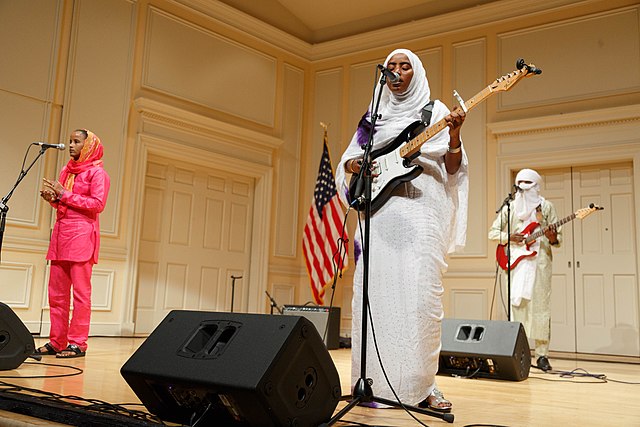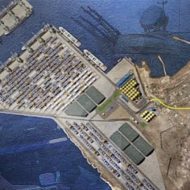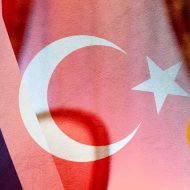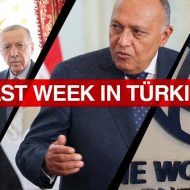Mali authorities are trying to initiate new peace talks with Tuareg separatists after the end of a 2015 UN-brokered peace deal. Bamako believes that the previous agreement did not cope with its task to save the country from instability and the threat of jihadists. The head of Mali, Assimi Goïta, said that he would not discuss the territorial integrity, unity and secularity of the state with the separatists and added that he would continue the fight against armed terrorist groups.
Tuareg militants oppose a new dialogue with Bamako. The alliance, called the Coordination of Movements of Azawad (CMA), confirmed the end of the peace agreement and called on its members to “reconsider” their goals in light of the new situation, which could mean an escalation of further fighting in northern Mali, where the Tuareg have blocked roads to the northern borders with Algeria, Mauritania and Niger, meaning a blockade of communication and support from these countries. How will the confrontation between the parties’ end, what do the Tuaregs want and who is setting them on the separatist path and unwillingness to come to an agreement with the Malian authorities?
Who are the Tuaregs?
The Tuaregs are an ancient Berber tribe that traditionally inhabits large parts of the Sahel and parts of the Maghreb: western Niger, eastern Mali, northern Burkina Faso, southwestern Libya and southeastern Algeria. The Tuaregs have preserved the most ancient foundations and traditions. In particular, to this day the Tuaregs have a ban on nakedness of the face by men. At the same time, Tuareg women do not cover their faces. A woman enjoys a privileged position in Tuareg society; kinship is transmitted through the maternal line. Many important decisions in society are made by the leader’s mother, who enjoys high authority. The Tuaregs profess Sunni Islam, however, they have retained many pre-Islamic traditions, so Tuareg marriage is strictly monogamous.
The Tuaregs preserved the ancient Berber language – Tamashek, as well as a special writing system, Tifinagh, based on the ancient Libyan script. Since the Tuaregs lead a predominantly nomadic and pastoral lifestyle and adhere to socio-political models with no vertical structure, they never had their own statehood, but at the same time actively resisted integration into other already existing states. The Tuareg have traditionally dominated sedentary societies adjacent to the Tuareg’s own zones, regularly raiding them, imposing tribute and enslaving them.
During the era of the creation of French West Africa, it was the Tuaregs who put up fierce resistance to the French, culminating in the Tuareg uprising of 1916-1917. It was possible to convince the Tuaregs to recognize French power only through bribing the leaders of individual influential tribes. After the countries of the Maghreb and Central Africa, where the Tuaregs made up a significant percentage of the population, gained independence, the role of the Tuaregs in this balance began to change rapidly, which affected the very way of life of the Tuaregs, reducing their influence, as well as violating the structures of relations with neighboring peoples that had developed over centuries.
Tuaregs in Mali before the 2012 coup
In 1990, Tuareg separatists attacked government targets in the Malian city of Gao, and brutal retaliatory attacks by the Malian military led to an uprising. The repression also exacerbated the ethnic aspect of the conflict, as many of the poorly trained soldiers sent to fight the Tuareg were from the Songhai and Zarmaci tribes. A ceasefire agreement with Tuareg rebel groups, brokered by Algeria in January 1991, soon collapsed. The government of Alpha Oumar Konaré, elected in 1992, has made reaching an agreement with Tuareg rebels in the north one of its top priorities. Konaré made numerous concessions to the Tuaregs, including reparations payments in 1992 and increased regional self-government.
In 1994, Libya supported a group of Tuareg rebels who again attacked Gao. The Malian army responded, and the country appeared to be on the brink of civil war. A new peace agreement was reached in 1995, and a disarmament, demobilization and reintegration program began in 1996. The Malian armed forces reduced their presence north of Timbuktu and the former rebels were integrated into the armed forces.
After a Tuareg uprising from 1990-96, a decade of fragile peace was followed by a series of major outbreaks of insurgency and, ultimately, an attempt at independence. In early 2006, former rebel Ibrahim Ag Bahanga attacked the garrisons in Kidal and Menaka under the auspices of a new rebel movement, the Democratic Alliance for Change. This led to an agreement brokered by Algeria in July 2006, providing for increased development initiatives for the region (funded by the European Union) and the reintegration of the rebels into the Malian army. The agreement proved fragile, and kidnappings by Tuareg forces along with clashes with Malian soldiers continued to undermine the ceasefire agreements.
From 2009 to 2012, the latent grievances felt by the Tuareg and other northern groups coincided with political factors that triggered the uprising against the Malian state, the declaration of independence of the Azawad region, and the eventual takeover of the north by French and Malian forces. This dissatisfaction contributed to the formation of groups that took an increasingly militant stance towards the government.
Libyan Tuaregs after the fall of Gaddafi
As a result of unsuccessful uprisings in Mali, as well as in Niger, many Tuaregs moved to Libya, where they took part in the civil war in 2011 on the side of Gaddafi. And after the fall of the Jamahiriya in 2011, many Tuaregs continued to “remain loyal” to the Gaddafi regime, which led to repression against them by the Libyan Government of National Accord (GNA). A supporter of the creation of the Great Islamic State of the Sahel, Gaddafi provided the Tuaregs with political support and protected their trade interests. The Libyan Tuaregs controlled the illegal transportation of oil from fields in the south to neighboring African countries. Gaddafi implemented educational, economic and social programs aimed at preserving the distinctive culture of the nomads, without trying to make them a “settled national minority.” Many of them received the opportunity to serve and receive military training in the Islamic Legion.
In 2019, Libya’s former permanent representative to the United Nations, Ibrahim Dabbashi, published documents showing that in 2009 the Libyan government granted citizenship to 1,722 Malian Tuareg fighters and 83 officers who were to serve in a special forces battalion under the command of General Ali Kanna. Ali Kanna’s southern forces in Sebha were almost the only stronghold of Gaddafi’s ideology after the fall of Tripoli on August 28, 2011, which were still controlled by the Gaddafi regime. On 6 September 2011, a large column of pro-Gaddafi Tuaregs from the Kanna’s Southern Battalion crossed the Algerian border before entering Niger According to rumors, Kanna was part of this convoy, and Gaddafi himself and his son Saif al-Islam were supposed to join Kanna on the way to Burkina Faso.
Several hundred Malian Tuaregs from the Libyan Magawir Brigade, led by General Ali Kanna, became the backbone of the National Movement for the Liberation of Azawad (MNLA). In 2013, he returned to Libya and began to assemble an army of Gaddafi supporters from local Tuaregs in Fezzan and people from neighboring Mali, Niger and Chad. At the same time, Ali Kanna opposes General Haftar’s Libyan National Army, where most of the officers of Gaddafi’s army serve. Ali Kanna is considered close to Hussein Al-Koni, the former Libyan Jamahiriya ambassador to Niger. He previously headed the Tuareg Supreme Council in Libya.
Tuaregs and Islamists during the 2012 Mali uprising
In 2012, Tuareg separatists from the MNLA rebelled in northern Mali, which destabilized the situation throughout the Sahel region and proclaimed the creation of the Independent State of Azawad on the territory of the same name with its capital in Timbuktu. In alliance with jihadists from the Ansar al-Din group, they took control of 2/3 of the territory of Mali. It is worth mentioning that since 2009, US military specialists have been training Tuaregs to fight the Islamists, however, many of them went over to the side of the separatists, who sided with the jihadists.
One of the founders of the People’s Movement for the Liberation of Azawad (MPLA), then the People’s Movement of Azawad (MPA), was Iyad ag Ghaly. In the past, he was not only a fighter for Tuareg self-determination in Mali, but also a prominent figure in jihadist circles, and was also a member of Muammar Gaddafi’s Islamic Legion. He started the Tuareg rebellion from 1990-1996, but eventually reconciled with the government. However, he later became the leader of radical Islamists in the region. At the start of the 2012 uprising, he offered himself as head of the MNLA but was rejected. The MNLA has repeatedly emphasized that it is a liberation secular revolutionary movement.
Ag Ghaly then formed the Ansar al-Din (“Followers of the Faith”) movement. Apparently, a group of Tuaregs, who are close to his views, have united around him. Ansar ad-Din participated in all major battles with the Malian army on the side of the MNLA. However, in the end, not only the government in Bamako, but also the traditional Tuareg leaders lost control over the situation. Having gained control of the northern territories of Mali, the jihadists from Ansar al-Din removed their allies from the Tuareg independence movement from power.
French and Western intervention and the UN peace agreement
Under the pretext of fighting terrorism, the United States, as well as EU and NATO countries, intervened in the events. The main role was assumed by the former metropolis, France, which resorted to military intervention. The operation was called Serval. Logistics support was provided by the USA, Germany, Great Britain and the EU. Formally, France referred to the request of the Malian authorities for assistance in the fight against terrorism. However, in fact, this was interference in the internal affairs of an independent state, which Paris considered its “traditional sphere of influence.” The end of the active phase of Operation Serval was announced shortly after it began. But the deadline for the withdrawal of troops was constantly postponed under the pretext of the existence of “military risks.” The operation lasted until July 2014, and then grew into Operation Barkhane, which continued until 2022 and expanded into the countries of the Sahel Five neighboring Mali – Mauritania, Burkina Faso, Niger and Chad.
In 2015, the then government of Mali brokered a peace deal with the militants through a UN mission called MINUSMA. But this document did not contain a clear disarmament program, a plan for the demilitarization of the northern territories and, most importantly, there was no concept of economic development. Moreover, France’s protégé, Malian President Ibrahim Keith, was unable to fulfill his obligations. The Tuaregs increasingly moved away from Bamako and increasingly sided with the jihadists. Despite the expansion of the French military presence in the Sahel, the zone of armed conflict increasingly expanded into the territory of neighboring states, primarily Niger and Burkina Faso.
Since 2013, the United States has also extended its influence in Mali, despite visible assistance to Paris in the logistics and technical equipment of the Sahel. Having its own military and air bases in the region (in Niger alone there are more than 800 US military personnel at two military bases), Washington continues to emphasize that the country only provides support to its partners in the fight against terrorism and does not take part in armed clashes. The United States used the Tuaregs to spread its own influence in the territories. The Americans also took advantage of the Tuareg’s connections with the Islamists to exploit their forces and attack French uranium mines. Supposedly under the guise of fighting terrorism, the Americans then took these mines under their control.
France’s allies in the fight against ISIS in Mali (Islamic State in the Greater Sahara, EIGS) are two Tuareg paramilitary organizations: the Movement for the Salvation of Azawad of Moussa Ag Acharatoumane and Assalat Ag Habi (which has around 3000 fighters) and the pro-government Touareg militia The Imghad Tuareg Self-Defense Group and Allies (GATA) (with around 1000 fighters) led by General El Hadj Ag Gamou (a former officer in Gaddafi’s army and a Tuareg rebel). Since 4 September 2019, he has served as Inspector General of the Malian Armies and Services.
Formed in 2014, the Coordination of Azawad Movements, which included Arab and Tuareg movements (including remnants of the MNLA), still controls parts of the North, such as the city of Kidal. Today they support Malian separatism and seek special status for Azawad. De facto, they are accused of connections with terrorists and separatism. French military and diplomatic efforts have not solved the problem of Tuareg separatism and Islamism in Mali.
Intensification of separatists after the 2021 coup and the departure of France
Since the coup in Mali in 2021, relations between the Tuaregs and the government of Assimi Goïta have worsened. Following a series of failed policy moves by France in the Sahel, Mali has called on the United Nations to withdraw its peacekeeping mission MISUNMA from the country, condemning its failure to provide security. However, this geopolitical move may seem like a defeat for Paris only at first glance, because France and the United States know that after the official withdrawal of the “UN peacekeepers,” the situation in Mali, which is now headed by an anti-French government, could worsen, which will give the colonialists a chance to re-enter the region.
Tuareg separatism in Mali, as well as the activation of al-Qaeda jihadists, are supported by proxy groups in France and other Western countries. Following the arrival of the Russian Wagner Group in the country after the request of the Goïta government, attacks on civilians by jihadists intensified. According to the Armed Conflict Data Project (Acled), the al-Qaeda-linked group is responsible for 33% of attacks. As part of these operations, terrorists attack civilians in various communities, believing them to be members of insurgent groups and supporters of the Wagner Group.
In the fall of 2023, an alliance of Tuareg separatists called the Coordination of Movements of Azawad (CMA) began to escalate the conflict with the central government. In September, CMA spokesman Mohammed Elmauloud Ramadan said separatists had taken control of Burem after weeks of fighting against the national army and Wagner mercenaries. The main complaint of the Tuaregs against the Goïta government is that Bamako wants to disrupt the 2015 agreement imposed by France and the UN. Goïta declared this agreement definitively invalid due to the failed mission of Europe. The activation of Tuareg groups reveals France’s desire to exert influence through its proxies, which include some of the Tuaregs, in order to maintain its influence in the region.
In December, Mali’s armed forces took control of the northern city of Kidal, considered a Tuareg stronghold. This was a major defeat for the separatists, who vowed to continue the fight. Some leaders of Tuareg groups live and prepare their attacks in Algeria. Relations between Mali and Algeria are at an all-time low since Bamako criticized Algeria for holding meetings with Tuareg separatists without the participation of Malian authorities. Both countries recalled their ambassadors at the end of December.
After the end of the 2015 peace agreement, the Malian authorities launched the process of concluding a new peace treaty without the mediation of France or anyone else. Algeria was the first to be concerned about Bamako’s new initiative. Algeria has established itself as a kind of guarantor of diplomacy and maintains friendly relations with the countries of the Sahel and the Maghreb, and it was this country that acted as a mediator between Bamako and the armed separatists, but the Mali authorities do not accept Algeria’s conditions precisely because of their hospitable policy towards the Tuaregs.
The Malian authorities have also opened an investigation into jihadists who are helping the Tuaregs stir up unrest in the region. They have put Islamist leaders linked to al-Qaeda on the wanted list on terrorism and money laundering charges amid deteriorating security in the country. The suspects include Iyad Ag Ghaly, a Tuareg militant and leader of Support Group for Islam and Muslims (JNIM). Also, on the list there are six Tuareg leaders belonging to an alliance of armed groups who renewed their rebellion against the state after Bamako’s abrogation of the 2015 peace treaty. JNIM was formed by the merger of Ansar Dine, the Macina Liberation Front, Al-Mourabitoun and the Saharan branch of Al-Qaeda in the Islamic Maghreb. Its leaders swore allegiance to Ayman al-Zawahiri.
The Tuareg factor is used by French and US troops in the Sahel region to destabilize and restore their influence. Ostensibly concerned about preserving the peace agreement in Mali, the Tuaregs are preparing the ground for a new intervention. Therefore, it is also important for them to discredit the Wagner PMC, accusing the troops of aggression against civilians. Fulani and Tuareg groups currently serve as bases for extremist movements in the region, notably the ISIS branch of the Islamic State in the Greater Sahara and the coalition of groups loyal to al-Qaeda (JNIM). However, even without intervention, external forces may try to fuel instability in Niger, which could lead to an escalation of tensions throughout the Sahel, where the same people live and the same cross-border groups operate.
Cover photo: Fatou Seidi Ghali, one of the only Tuareg female guitarists in Niger, leads Les Filles de Illighadad during a Homegrown Concert Series performance, September 19, 2019. Photo by Shawn Miller/Library of Congress.









Leave a Reply